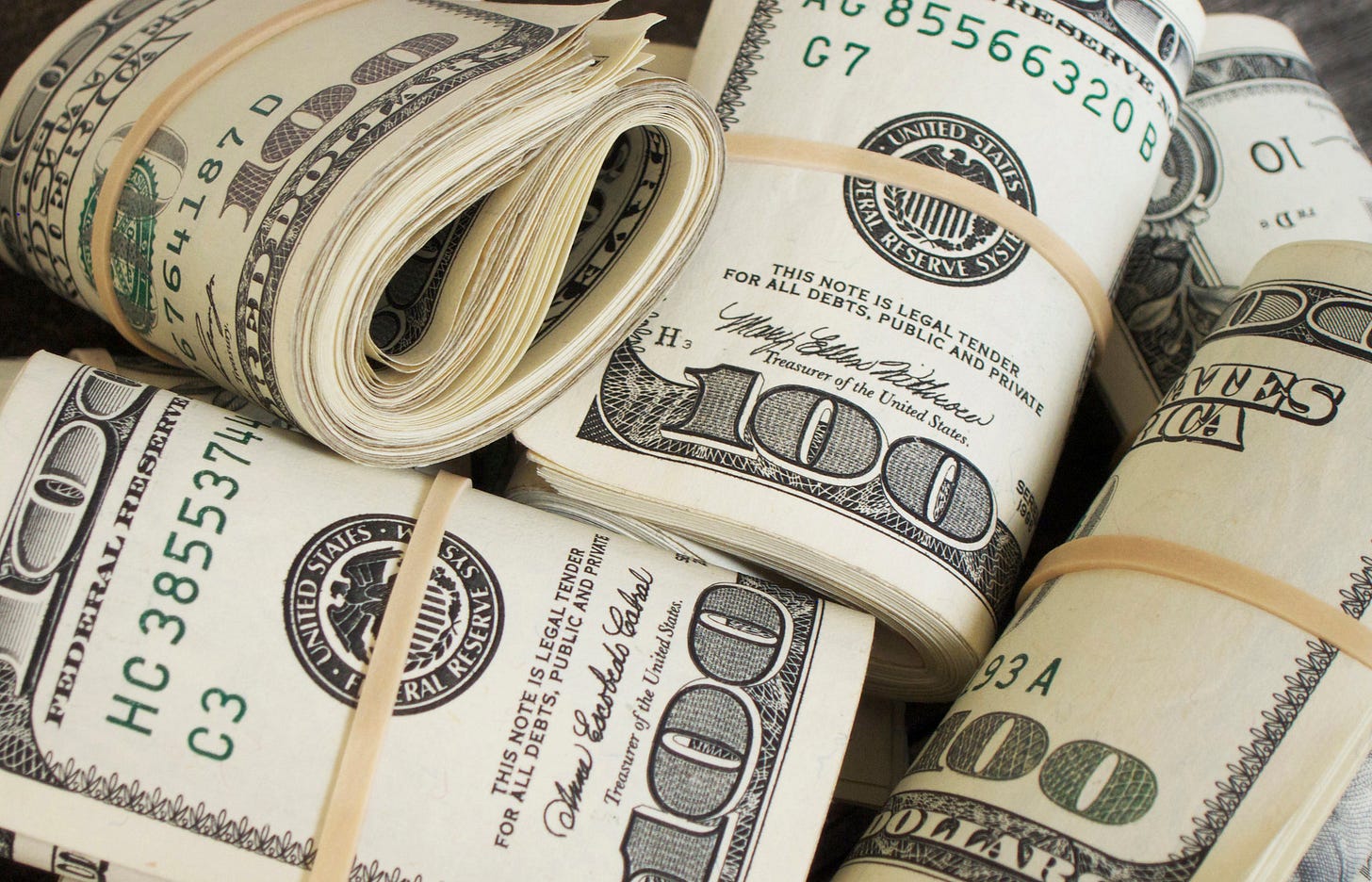"From the bridge out of Hammond, see the big city moon."
No one really knows what "the economy" is, but the media sure as hell can talk about "vibes."
This week’s soundtrack: Songs:Ohia - “Steve Albini’s Blues”
During the 1992 presidential campaign, political strategist James Carville famously coined the term “It’s the economy, stupid.” The phrase has become something of a North Star for pundits when talking about presidential elections and incumbents.
More than 30 years later, I get irrationally frustrated by that phrase and the concept behind it: mostly that “the economy” itself is something concrete or explainable and something that drives elections. I put it in scare quotes because it is not a definable trait, but rather a feeling that voters have. This, it could be argued, was part of the surprise of the 2016 election to so many; I’ve long said that the people who cite the stock market (as the economic indicator) are disconnected to everyone else when approximately half of the country doesn’t have enough money to cover a $500 emergency. Pundits cite unemployment rate, GDP, the stock market, interest rates, consumer confidence and on and on. It seems that there are more economic indicators than there are stars in the sky.
(The idea that an American government or an administration or a president is responsible for the economy is party of the broader problem. Since the COVID-19 economic crisis began, we’ve had: lockdowns, Chinese economic stagnation, the war in Ukraine, deaths of more than six million workers worldwide and, of course, the Ever Given getting stuck in the Suez Canal. In a globalized economy, the proverbial levers that a White House can push are fairly small.)
In the last three years, inflation has become the thing by which opponents to President Joe Biden have cited the most. Inflation is the latest economic indicator, but even inflation has decreased over the last year. Biden gets hammered for his handling of “the economy” (again, whatever that is) in polling and that has recently come to fruition in two trend stories in two of the most important news organizations in the United States.
In these stories, the ephemeral (and sometimes contradictory) nature of “the economy” is the centerpiece. The economy being more of a feeling than something real is a very human thing, but it’s also a difficult thing to square. It’s all based on ~vibes~, which is hard to pin down and even harder to defense. This is a frustration with which I am constantly struggling; everything economic is atmospheric and, in a country of ~350M people… those atmospheres are very different for different people.
In the first of these stories, The New York Times centers social media (“TikTok Economics” in the headline) influencers and explainers. The lede, as often happens, cites a myriad of economic indicators that suggests the economy is good.
Look at economic data, and you’d think that young voters would be riding high right now. Unemployment remains low. Job opportunities are plentiful. Inequality is down, wage growth is finally beating inflation, and the economy has expanded rapidly this year.
It then pivots to the greater story: The ~vibes~.

Ms. Scanlon rose to prominence in the traditional news media in part for coining and popularizing the term “vibecession” for how bad consumers felt in 2022 — but she thinks 2023 has seen further souring.
As often happens, the conversations about economics rely on things like home ownership (less available to millennials than to previous generations), but the story doesn’t really tackle that in substantial ways.
But the housing affordability trend that the videos spotlight is grounded in reality. It has gotten tougher for young people to afford a property over time. The cost of a typical house was 2.4 times the typical household income around 1940, when government data start. Today, it’s 5.8 times…
Those higher prices do not necessarily mean people are worse off: Household incomes have also gone up, so people have more money to cover the higher costs. Consumer expenditure data suggests that people under 25 — and even 35 — have been spending a roughly equivalent or smaller share of their annual budgets on groceries and gas compared with before the pandemic, at least on average.
“I think things just feel harder,” said Betsey Stevenson, a professor of public policy and economics at the University of Michigan, explaining that people have what economists call a “money illusion” and think of the value of a dollar in fixed terms.
To give you a peak behind the journalism curtain, numbers generally bore readers. Every story needs a hook and TikTok economist people are the hook here. I’m torn about the story, as there is good stuff in the bulk of the body – the stuff I pulled above – without going too hard on the numbers, but the hook of TikTok economists speaks to the difficult problem that is inherent with economic stories.
The second story, from The Washington Post, takes slightly different a different road, but arrives at the same tenuous finish line. Instead of TikTok economics, the story frames social media and the virality of an old post as the reasons for the bad ~vibes~ surrounding the American economic outlook. A December 2022 short video about McDonald’s prices – tl;dr version of the TikTok: A guy bought a novelty “Smoky” Big Mac meal and it cost $16.10 – keeps being recycled online and it’s stoking fears about inflation.
Still.
Like the Times story, this particular examination looks at different indicators and debunks the notions that the economy is as bad as a $16.10 McDonald’s receipt. Also, like the Times, the Post notes that Democratic officials are trying not to do a “the lady doth protest too much” at the viral content.
One Democratic official, who spoke on the condition of anonymity to describe private conversations, said: “What are we supposed to do, tell the president or Chuck Schumer to send a tweet saying, ‘Hey, most Big Macs aren’t that expensive?’ It would look ridiculous.” A spokesperson from McDonald’s did not return a request for comment…
“There’s a huge divide internally about whether we’re going to claim success or try to draw a contrast” with Republicans, said one Democratic consultant who has pushed White House officials to stop touting economic accomplishments and instead hammer the GOP’s economic plans. The official spoke on the condition of anonymity to reflect private conversations. “I don’t know how long we can keep doing this and expect a different result.”
This framing, rightfully, is more reliant on the social media aspect and the political implications. The Post’s audience is more likely to be politically connected and less knowledgable about social media, so having a star reporter like the incomparable Taylor Lorenz on the byline is key to delivering for that audience.
Apologies for being in reruns, but a major job of journalism is to explain complex concepts in digestible ways. I don’t know that “people think the economy sucks, but it actually isn’t that bad for everyone” is even a thing that can cut through the noise.
The noise, though, is increasingly the story. Over at Where’s Your Ed At, Dave Weigel talked to Ed Zitron about how feelings are becoming the dominant conversation around a economy that isn’t as bad as it seems (or is, depending on who you are).
Things that were bad in 2008, there was a chance that they'd get better… Work got worse over this period, even at times when things bounced back… You don't get as many bright spots as your parents did, if your parents are baby boomers.
Weigel says a lot in the podcast with Zitron, but the above quote is illustrative of the distance that separates the news media from the population. Weigel makes a lot fo good points, but a lot of this is theater criticism and not policy criticism (because, again, the White House is hardly solely responsible for the seeming infinite factors that make up the interconnected world economy). It is a lot of ~vibes~ because that’s all that’s out there to be explained.
When it does come to policy, Eric Levitz tackled Biden’s once and future nemesis Donald Trump and various proposals. The big man’s actual policies, should they become reality, would really mess with the labor market and the economy. In short, Levitz reports, Trump would actually tank the economy with the few levers that the White House actually has to pull.
Multiple studies of Trump’s tariffs on Chinese goods — including specialities such as silk embroidery — found that U.S. consumers paid roughly 100 percent of their costs.
What’s more, in addition to the immediate costs of tariffs, such duties also have second-order effects that further increase prices: When American producers no longer have to compete with lower-cost foreign exporters, they can raise the prices of their goods without losing market share. In fact, this is the whole point of tariffs as a tool for industrial policy. If you insulate domestic producers from competition, thereby allowing them to increase prices, then investors will put more money into these increasingly profitable domestic enterprises. Over time, that will grow the nation’s productive capacity in the protected industry.
Not only would Trump impose huge tariffs, but his famed immigration policies would come back with a vengeance. Trump and his camp are ready to make enforcement more strident, more violent and more intense.
Existing law makes it harder to rapidly remove longtime U.S. residents. But Trump has a plan to get around that. First, he would scale up workplace raids and other sweeps of public places where undocumented immigrants are thought to be. Then, he would consign such immigrants to indefinite detention in sprawling camps. These immigrants would still retain their right to challenge their deportation in court, through a process that can take years. But they would need to wait out that legal process in detention. Miller’s bet is that this will effectively enable the expedited deportation of longtime U.S. residents, who will prefer exile to de facto imprisonment…
The relationship between inflation and immigration is not entirely straightforward. Working-age immigrants expand America’s supply of labor. But they also increase economic demand by consuming goods and resources. In an aging country, however, the admission of working-age immigrants is likely to be deflationary on net.
Retired people consume goods and services, but do not contribute to their production. Thus, as the retired share of the population increases, labor demand can outrun supply. This can lead to labor shortages, which in turn lead to inflation. By allowing more working-age people to come to the United States, America can reduce this mismatch between labor demand and supply.
…Trump’s plan to purge the nation of millions of immigrants would therefore make the nation collectively poorer, while driving up the cost of groceries and myriad vital services. Further, by juicing prices, Trump’s policies could lead the Federal Reserve to further hike interest rates in the hopes of quelling demand, which could eventually lead to looser labor markets, should the central bank trigger a recession.
Putting aside the inhumanity of all American immigration policy, this would be very bad for the economy (emphasis above is mine). I recommend reading the entire Levitz post, but I’ll supplement it with my usual rant about immigration and our political moment (feel free to scroll past my usual soapboxing about the gap between governing and politics):
“Fixing” immigration is fairly straightforward, but there is no reward for fixing it and it is not a quick fix. Broadly, the immigration “crisis” is a paperwork one; people need to be processed more quickly, which means more people working at DHS agencies and more immigration judges. Processing people’s claims of asylum or legal status is what is so slow, especially with the ebbs and flows of immigration.
But, there’s no reason to actually process people; no reason to solve the backlog problem. On the nativist-xenophobic right, the “waves” and “caravan” are an easy villain to fundraise against (in the case of the Trumpist and associated elected officials) and to stoke fear (in the case of media entities like Fox News). The immigration panic rewards the nativist-xenophobic right quite a bit because it’s scarier than it is dangerous.
On the center, rich guy side of things, undocumented labor is preferred to documented labor. Undocumented workers don’t have to get health insurance or have various payroll taxes or follow OSHA regulations and on and on. Under-the-table and seasonal work for undocumented people is cheaper than treating people like people (which is not how rich, Chamber of Commerce types like to operate). The rich guy part of the Republican party – the part that donates money to politicians – has no need to actually fix this problem.
That leaves the center-left (also funded, mostly by the way, by the Chamber of Commerce folks) and the hard left to work to fix immigration. The latter has had more heft in the political process in recent years, but it remains fairly small as compared to the center and the right (there’s no money in progressivism. George Soros isn’t as powerful as your friendly neighborhood antisemites would like you to believe [shoutout
and her wonderful book]). Counting on the progressive left to fix immigration because it’s the morally correct thing to do… that’s a ridiculous idea.Outside of the Chamber of Commerce incentive structure, it’s also worth noting that center-left Democrats don’t want to fix the problem, either. Biden’s immigration policy doesn’t scan too far from the Trump’s immigration policy; even with Biden being more progressive than his predecessors, the center-left takes its cues from the White House on this decidedly non-progressive policy stance.
The incentive structure is fucked up, basically. No one benefits – except for the immigrants, of course – from successful immigration reform. The realpolitik side of me understands this, even if I’m furious as the humanity of it all.
To bring it back to the broader ~vibes~ around the economy, the gaps between what Americans know, what they feel and what the reality is… huge. The protectionist types are fairly vocal, which is a very valuable thing in the attention economy, but we’d basically have an American Brexit-style economic meltdown if Trump enacts even half of his wishlist.
Over the last couple of decades, some things have tracked well with economic indicators (the price of technology and the price of fuel, most notable), while others have not (housing, mostly, but McDonald’s value meals are a different indicator). It’s fairly well-documented that my generation is the first that hasn’t done better than our parents’ generation (mostly because Boomers are hoarding wealth, particularly in the housing sector), so the ~vibes~ thing is perhaps an (imperfect) indicator of those facts.
This is only going to become more of a conversation in the mainstream media over the next year. As the 2024 presidential election approaches, the “It’s the economy, stupid” crowd is going to dominate coverage. I just wish that crowd was better at actually explaining what it means when it says that, instead of relying on TikTok stars or McDonald’s receipt from 2022.
Lulu Update
My girl is eight! Lulu’s birthday was Friday and she was spoiled with toys and a birthday cake treat (not pictured because she ate it too quickly).
She still acts like a puppy, so it’s hard to believe that she’s in late middle age. I imagine she’ll get very old very fast (this happens to almost all bulldogs), but I’m cherishing the time I have with my lunatic.
A Recommendation: Spencer Ackerman’s Kissinger Obituary
I didn’t get around to writing this week about Henry Kissinger’s death and the coverage – both of the online-damaged people on Twitter/BlueSky/etc. and of the mainstream “both sides” ghouls – of his death. You may have read Spencer Ackerman’s obit that ran in Rolling Stone, but if you have not, I highly recommend it. RS’ stature (both as a political publication and a cultural musical force) is up for matter of debate, but that doesn’t blunt Ackerman’s place in the culture nor his words in the obit.
Even more, the incomparable Marisa Kabas has a Q+A with Ackerman that is definitely worth your time. “[Kissinger] is exemplary in terms of the bloodshed he inflicted and sponsored under the guise of statecraft” is a perfect encapsulation of the man. Kudos to Ackerman for saying it and Kabas for spurring it in the interview.








